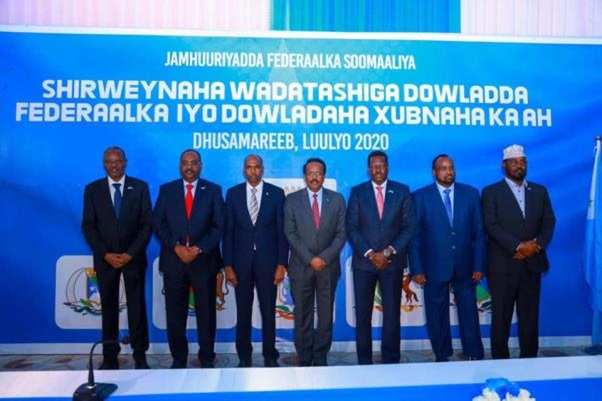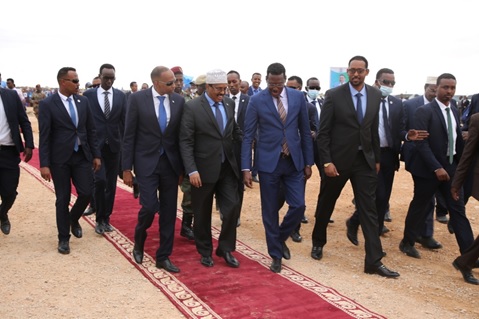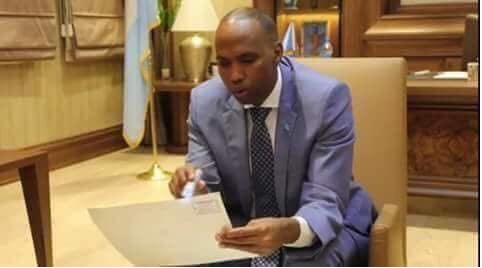By Faisal A. Roble
Background
The recent consecutive talks that took place in Dusamareeb have many dimensions of reconciliation, emergent leadership in Galmudug, and the fatal political crack in the top leadership of the federal government.

To appreciate the full scope of said multidimensional talks and the agreements reached in Dusamreeb, we need to revisit where Somalia was in its yet-to-settle journey to recover from statelessness and the colossal collapse of its republic as a result of the 1990 civil war and the ensuing chaos. Between 1990 and 2012, Somalia was either stateless or had a disheveled, only on-paper traditional governments that were so weak that the entire state structure was limited to wherever the president resided at that time – Jawhar, Biadoa, or Mogadishu.
Following the election of Sheikh Sharif Sheikh Ahmed as a compromise president between religious clerics and secular forces, the transition ended in earnest and a more planned journey guided by road maps often assisted by the financial muscle and worthwhile expertise of the International Community (IC) was set in full motion.
What is now known as the Garowe Principles I and II, which were organized and drafted in December 2011 and in February 2012, respectfully, ended that chaotic transitional federal arrangements and laid the foundation for a comprehensive more permanent federal system of government.
Key provisions in the first Garowe conference (Garowe I) are the following:
- Downsizing the national parliament from 500 plus to a more manageable number
- Creating a bicameral federal legislature (Senate and house of legislators)
- Apportioning at least 30% of parliament seats to Women
- establishing a national constituent assembly to oversee implementation of the principles.
The issue of a presidential or hybrid governing systems was left as unfinished business and would be decided later.
Garowe II agreed to “reaffirming the Garowe I Principles, the establishment of federal states as referenced in the Transitional Federal Charter of 2004, deciding the status of Mogadishu by a federal parliament, and recognizing Puntland as a founding federal state.” It is here where President Farmajo and company are wrong in their Faustina but dangerous approach to weaponize the status of Mogadishu for political calculus, and where Puntland leadership rightly invoked the principles of Garaowe to counter.
So far, the Garowe principles helped Somalia to stay course and follow the federal system. Some issues such as the “status of Mogadishu” or the system of government – presidential or a hybrid – will be decided through a constitutional process.”
Memorializing these principles kept Somalia on track and earned Puntland the guardian of the AGREED upon federal system. In return, Puntland gained prestige and fame from her role in safeguarding these principled repositories for the rest of the nation.
The Dusamareeb Aftermath
Following two productive conferences in Dusamareed, Ahmed Abdi Karia (Qorqor), the newly seated president of Galmudug, has put himself on the leadership map of Somalia. He, along with President Said Deni, achieved what President Farmajo and former Prime Minister Hassan Khayre failed to achieve – bring all Somalia’s stakeholder to talk and agree on an electoral timeline and model. Villa Somalia stagnated the electoral process of the country for over three years, not to mention its recalcitrant behavior to intentionally break down any form of communication with Puntland and Jubbaland, President Qorqor and president Deni met in Kalkayo on June 26, 2020 and solidified their collective resolve to bring all stakeholder to Dusamareeb.

Hailed as a positive start, President Qorqor, a new but effective addition the regional leaders, took the responsibility to host the talks in Dusamareeb. Thanks to a new but energetic cabinet and an experienced Chief of staff he hired, President Qorqor’s team organized what would pass as productive talks. Most Somalia politics observers welcomed Dusamareeb’s effort and the subsequent communique (see communique – where it was decided to hold timely and fair elections of 2020/2021 for the parliament and the president ). In so doing, the communique also discredited the phantom Farmajo favorite ploy of one-person-one-vote (OPOV).
Followed by Dusamareeb II, President Qorqor succeed to assemble both the federal government and federal member state between July 11-13. As important as the resolutions reached in Dusamareeb II were, President Qorqor’s success to secure the federal government’s acceptance to partake and accept the resolution to hold timely and credible elections cannot be underestimated, notwithstanding the political crack that surfaced between President Farmajo and his former Prime Minister, Hassan Khayre.

That political crack between him and Villa Somalia, fall out may suite, costed Khayre dearly. As flamboyant as the former Prime Minister appeared on the surface and contrary to stage machoism and authoritative image he projected, Khayre in real terms had no political base. His claptrap and empty rhetoric often in a meandering elementary Somali words, such as “Galmudigay waan nabad,” or “underneath Galmudug’s soil lies the longest river….” his outsized love for expensive suits and travel itineraries on private jets in a nation where the per capita income is about $200/month, is at best a measurement of inaptitude, a deep-seated insecurity and lack of a service-oriented mission in life.
As shown in the overwhelming votes that removed him from office, 170 against vs. 8 for, it is telling how he was nothing but only a servant to President Farmajo with no political base. Notwithstanding the irregularity surrounding the method by which he was casted aside, the truth of the matter is that he betrayed his boss. Oblivious to any accountability, Khayre’s bravado and boundless boasting led him to betray his boss of three years in the wee hours. Of course, the punishment of such a salient last-minute defiance and disregard to his boss’s position was met with a sever consequence.
President Farmajo, by using his acolytes (Fahad Yansin and the immutable Khadija Diriye) severely and quickly punished Khayre. Of about 70 cabinet members whom he supervised that are also parliamentarians, only 4 sided with him. To add insult to an injury, even of the 64 parliamentarians from his own clan, only about 5 voted in his favor.
Moreover, the tally of the votes is an indication of how little loyalty he enjoyed from his own staff. This is entirely a reflection of how lonely autocratic and arrogant rulers are for they suffer from deficit in loyalty from their own employees. Both in print and life, the nation witnessed how arrogant, undisciplined, and devoid of humility Khayre has been. At the pinnacle of his power, he fired seasoned minsters in unceremonious ways (having them called while doing their job and firing them); he also treated some senior ministers arrogantly and disrespected them in televised deliberations.
In the aftermath of handing over Qalbidhagax to Ethiopia, a criminal and treasonous act at face value, Khayre never showed remorse till this day.
Yet, unbeknownst to his boss, Khayre in an opportunistic move broke ranks with the President and with the overwhelming majority of his own government only to get discarded in the most humiliating and unceremonious way – he reaped what he had sown, or fittingly as the Somali adage says, “booraan hadimo ha qodin ku dhici dontaana mooye.” In short, Kharyre got burned in the flames of his own fire.
Now that things fall apart, he rather better relax and listen to the classical song of Eva Peron’s “don’t cry for me Argentina!” to console him and his bruised ego rather than belabor in a poorly organized postmortem search for vindication in “anoo og, anoo og…” (I recommend for him to rather listen to the 1980s Madonna version of Evitta’s for consolation).
The Debt Owed to Dusemareeb
Unprecedented and news making as Khayre’s sexy downfall is, the better story with a posterity for Somalia in the next few months is the success reached by all actors in Dusamareeb I and II. The resolutions to conduct timely and credible elections, and to come up with a practical model within the time span left in lieu of the phantom one-person -one-vote are historical achievements.
As historians write about Dusamareeb experience in the future, they will certainly underscore the leadership quality of President Ahmed Abdi Karia (Qorqor). His strength so far is shown in his capacity to talk to anyone with a positive message. Such was his acceptance of the suggestion by President Said Deni to meet and sort out issues between Villa Somalia and the FMS; in his part, President Deni has shown great leadership in the time that he had shepherd Puntland (another time to evaluate him).
Incomparable qualities of President Qorqor that most Somalis already observed are his confidence to surround himself with people who know their trade better than he does and his demeanor to listen to their advice. Often Somali leaders look for the weakest link. That is certainly true in the case of President Farmajo and former Prime Minister Khayre.
On the contrary, President Qorqor reached out to the most experienced, sometimes controversial personalities within his community, and put them in positions where hey can help him – the mark of a great leader. He also succeeded to brake barriers between animus parties – Villa Somalia against Puntland and Jubbaland – and help chart a new course of action for Somalia.
The story of Dusamareeb I and II is the story of a renaissance of the politics of Galmudug. After all, some attribute the historical role of Abdullahi Isse, Somalia’s preeminent freedom advocate, to his upbringing in Gal/mudug region. So far, President Qorqor has succeeded to change the portrait of Galmudug and reposition it in a broader Somalia political landscape.
The question is whether he will stay course. Losing this newly gained leadership and national prominence for his state is entirely in his hand. And, unlike in the past, the nation would be scrutinizing him and his move commensurate to his newly gained status.
Faisal A. Roble
Email: [email protected]
———–
Faisal Roble, a writer, political analyst and a former Editor-in-Chief of WardheerNews, is mainly interested in the Horn of Africa region. He is currently the Principal Planner for the City of Los Angeles in charge of Master Planning, Economic Development and Project Implementation Division
We welcome the submission of all articles for possible publication on WardheerNews.com. WardheerNews will only consider articles sent exclusively. Please email your article today . Opinions expressed in this article are those of the author and do not necessarily reflect the views of WardheerNews.
WardheerNew’s tolerance platform is engaging with diversity of opinion, political ideology and self-expression. Tolerance is a necessary ingredient for creativity and civility.Tolerance fuels tenacity and audacity.
WardheerNews waxay tixgelin gaara siinaysaa maqaaladaha sida gaarka ah loogu soo diro ee aan lagu daabicin goobo kale. Maqaalkani wuxuu ka turjumayaa aragtida Qoraaga loomana fasiran karo tan WardheerNews.
Copyright © 2024 WardheerNews, All rights reserved


